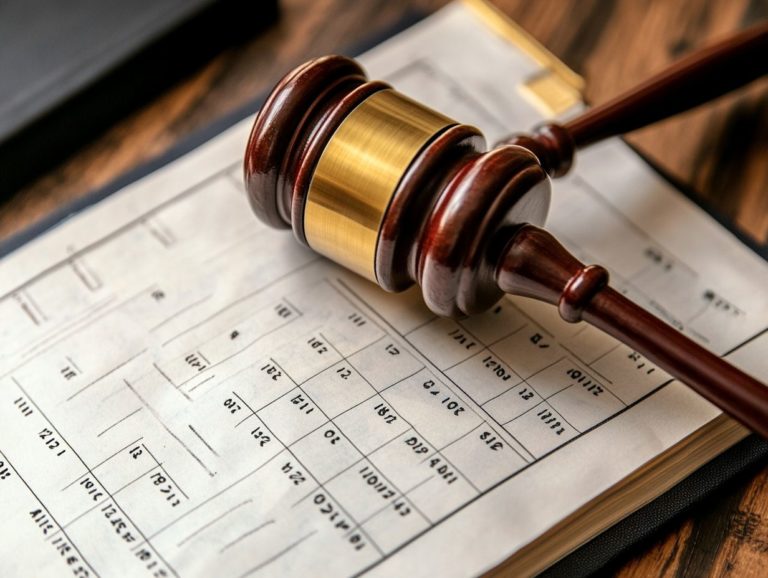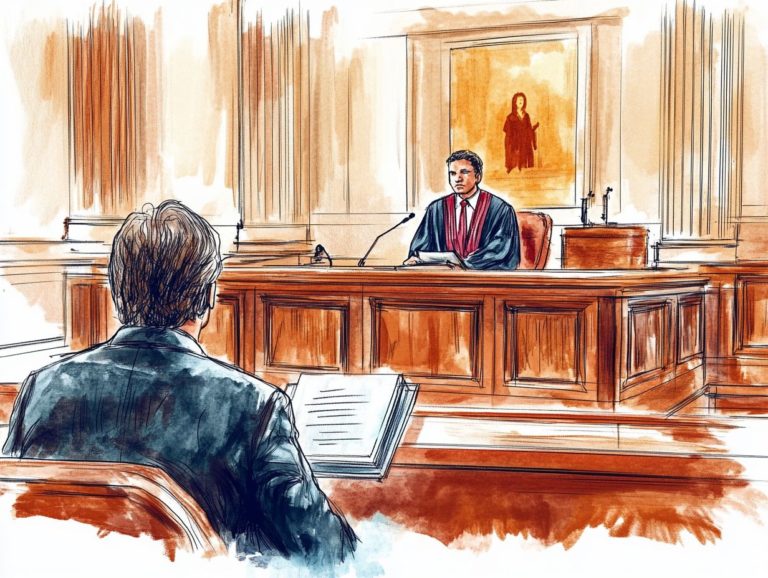Building a Defense for White Collar Crimes
White collar crimes, marked by deceit and concealment, can cast a wide net of consequences affecting both individuals and businesses.
Understanding the different types of these crimes is essential for navigating the legal system. This piece delves into the fundamental aspects of white collar crime defense, highlighting common legal defenses like mistake of fact and lack of intent. It also emphasizes the vital role of defense attorneys and the implications of potential outcomes, ensuring you are well-equipped with the knowledge necessary to confront these complex issues effectively.
Contents
- Key Takeaways:
- Understanding White Collar Crimes
- Common Defenses for White Collar Crimes
- Gathering Evidence for a Defense
- Working with a Defense Attorney
- Choosing the Right Attorney
- Collaborating on a Defense Strategy
- Possible Outcomes and Consequences
- Plea Bargains vs. Going to Trial
- Frequently Asked Questions
- What are white collar crimes?
- What are some common types of white collar crimes?
- What is the first step in building a defense for white collar crimes?
- What strategies can be used to build a defense for white collar crimes?
- Can a plea bargain be used in building a defense for white collar crimes?
- What are the potential consequences for being convicted of a white collar crime?
Key Takeaways:

Understand the definition and types of white collar crimes to better assess your defense strategy.
Gather key pieces of evidence and work closely with a defense attorney for white-collar crimes to build a strong defense.
Consider the potential outcomes and consequences, such as plea bargains and penalties, when deciding whether to go to trial or seek a plea deal.
Understanding White Collar Crimes
White-collar crimes encompass a wide array of non-violent, financially motivated offenses, such as embezzlement, securities fraud, money laundering, and healthcare fraud. These offenses are typically perpetrated by individuals, businesses, or government officials within their professional domains.
The complexity of these crimes often means they involve intricate financial documents and high-stakes scenarios. This can lead to severe criminal charges, significant financial restitution, and lengthy prison sentences.
The term ‘white-collar’ was introduced by sociologist Edwin Sutherland to differentiate these crimes from blue-collar offenses. This highlights the importance of criminal intent and the far-reaching impacts on victims, which can include both individuals and entire industries.
When facing fraud allegations in federal court, securing legal representation from experienced white-collar attorneys, like those at Sellers Law Firm, is essential.
Definition and Types of White Collar Crimes
White-collar crimes include a range of non-violent financial offenses, including embezzlement, healthcare fraud, and securities fraud. Typically committed by individuals in professional settings for personal gain, these crimes significantly impact both the economy and individuals.
These offenses involve a sophisticated use of deceit, where perpetrators exploit their trusted positions to manipulate systems for illicit benefits. For instance, embezzlement occurs when someone in a position of trust misappropriates funds that have been entrusted to them, often leading to considerable losses for organizations.
Healthcare fraud often involves billing for services that were never rendered or knowingly providing unnecessary medical care, resulting in inflated insurance costs.
Similarly, securities fraud can involve insider trading and misrepresentation of company information, undermining market integrity. These offenses can lead to serious penalties, making it crucial to understand them.
The necessity for vigilant enforcement and robust regulatory measures is underscored by the reality of these consequences.
Common Defenses for White Collar Crimes
Defending against white-collar crimes requires a sophisticated array of strategies designed to critically assess and challenge the prosecution’s case. A crucial focus should be on demonstrating the accused’s lack of criminal intent, which is a key element in crafting a robust defense strategy for fraud cases and intricate charges such as embezzlement.
Mistake of Fact
A mistake of fact defense arises when you argue that you misunderstood a fact that negated your criminal intent. This underscores the crucial role of intent in assessing criminal liability.
This principle holds particular weight in cases involving fraud or embezzlement, where the prosecution must establish that you possessed guilty knowledge. For example, if you mistakenly believed you were entitled to a certain amount of money due to a legitimate error in an accounting statement, that misunderstanding could serve as a valid defense.
Similarly, if a business owner unintentionally misinterprets tax laws and accidentally underreports income, the mistake of fact can serve as a foundation for defense strategies aimed at lessening culpability. Therefore, grasping this concept is vital for both defense attorneys and defendants as they navigate the complex landscape of criminal law.
Lack of Intent

The defense of lack of intent is crucial in white-collar crime cases. It aims to show that you did not intend to commit the alleged crime, which is often vital for a conviction.
By demonstrating that you acted without wrongdoing or malice, your lawyers can effectively challenge the prosecution s narrative. The burden of proof the obligation to prove one’s assertion rests with the state, which must establish intent beyond a reasonable doubt for a successful conviction.
Your defense team will dive deep into the evidence, looking for clues that could help your case. They will analyze the nuances of the evidence to uncover genuine misunderstandings or errors instead of intentional deceit.
Your team may also explore your character and background, providing context that strengthens the claim of an absence of intent. If the court finds sufficient doubt regarding intent, it can lead to the dismissal of the charges, allowing you to avoid serious repercussions.
Entrapment
An entrapment defense arises when you assert that law enforcement induced you to commit a crime you would not have considered otherwise. This brings the ethics of the prosecution into question and challenges the integrity of due process.
This legal concept investigates whether individuals were truly inclined to engage in criminal activities or merely responding to law enforcement strategies designed to provoke such actions.
In white-collar crimes, where complex schemes often blur legal boundaries, the entrapment defense can be crucial. Take the significant case of United States v. Jacobson, where the court sided with the defendant, revealing that manipulative tactics pressured him into committing unlawful acts he had no original intent to pursue.
These cases highlight the delicate balance between effective law enforcement and the protection of individual rights. They ignite ongoing discussions about the ethical ramifications of sting operations in financial crimes.
Gathering Evidence for a Defense
Collecting evidence is essential for crafting a strong defense against white-collar crimes. It requires careful examination of financial documents and strategic planning to counter the prosecution’s challenges.
This careful approach strengthens your case and prepares you for what lies ahead.
Key Pieces of Evidence to Collect
Key evidence in white-collar crime defenses often includes financial documents, emails, and witness testimonies that support your claims of innocence or lack of intent.
Financial documents like accounting records and transaction histories can clearly demonstrate the absence of fraudulent activity, highlighting the legitimacy of your business operations. For instance, organized balance sheets may reveal discrepancies that challenge embezzlement accusations.
Emails serve as critical evidence, illustrating the intent behind your decisions and clarifying misunderstandings. A chain of emails about compliance practices could significantly strengthen your defense.
Credible witness testimonies from colleagues or industry experts can further affirm your character or intent, providing context that data alone cannot convey.
Working with a Defense Attorney
It s vital to engage a skilled defense attorney immediately to protect your rights. These legal experts offer strategic guidance tailored to your unique situation while maintaining confidentiality.
They expertly navigate the complexities of the legal system and the nuances of courtroom dynamics.
Choosing the Right Attorney

Selecting the right criminal defense attorney is essential when facing white-collar crime charges. The expertise and understanding of the legal framework that your attorney brings to the table can significantly influence the outcome of your case.
Understanding white-collar crimes requires a skilled guide, particularly someone with a solid background in financial laws, securities fraud, and tax evasion.
You should prioritize candidates with a proven track record in defending against financial crime charges. Ensure they possess the analytical skills and strategic mindset necessary for success in such cases.
To effectively evaluate potential lawyers, it s wise to review client feedback and previous case results, confirming that their qualifications match the specific nuances of your charges.
It s also advantageous to find an attorney who comprehends the legal landscape and can articulate complex information clearly, providing you with reassurance and clarity during this challenging time.
Collaborating on a Defense Strategy
Collaboration between you and your defense attorney is essential for crafting an effective defense strategy. This partnership allows for a deep dive into the nuances of your case and offers the flexibility to adapt legal approaches as new evidence surfaces.
The success of this collaboration relies on open communication. Your attorney provides valuable legal insights, while you share vital personal context and details that could significantly influence the case. This transparent dialogue fosters trust and ensures that every possible defense is thoroughly explored.
As you both navigate the complexities of the legal landscape, understanding the dynamics of this partnership becomes critical. Regular meetings, updates on case progress, and candid discussions about potential outcomes lay the groundwork for a robust defense strategy.
Legal representation isn t just about advocacy; it s also about educating you on your rights. This engagement enhances your involvement in the process, ultimately leading to a more informed and enabled approach to your defense.
Possible Outcomes and Consequences
The potential outcomes of a white-collar crime case can vary considerably. You may encounter options like plea bargains and reduced sentences, or you might face full trials that lead to substantial penalties and financial restitution for victims.
Having a strong attorney by your side is crucial for navigating this process and protecting your future.
Plea Bargains vs. Going to Trial
Choosing between a plea bargain and a trial is a crucial decision. Each option has its own penalties and consequences. This decision can profoundly influence the outcome of an alleged fraud or embezzlement case, placing you at a crucial crossroads.
A plea bargain is when you agree to plead guilty to a lesser charge to receive a lighter sentence. While plea bargains often offer reduced sentences, they may also result in a criminal record that could hinder future employment opportunities. Conversely, opting for a trial provides the opportunity to defend your innocence, yet it comes with the risk of facing more severe penalties if found guilty.
In this intricate decision-making process, the role of legal representation cannot be overstated. A skilled attorney can illuminate the complexities of your case, assisting you in carefully weighing the advantages and disadvantages of each option. The quality of your legal counsel can significantly tip the scales in favor of a plea deal or a trial.
Potential Penalties and Sentencing
White-collar crimes carry harsh penalties. You could face long prison sentences, hefty fines, and be required to pay back victims.
These violations include activities like embezzlement, fraud, insider trading, and money laundering. Each comes with its own consequences.
For example, if convicted of securities fraud, you could face years in prison and significant fines. If found guilty of embezzlement, you might have to repay the stolen amount and serve time behind bars.
Courts consider the intent behind these crimes and their impact, which can influence sentencing. Offenders also face reputational damage and challenges in finding future employment, highlighting the extensive implications of white-collar crime.
Frequently Asked Questions

What are white collar crimes?
White collar crimes are non-violent offenses committed by individuals or organizations for financial gain. These crimes typically involve deceit, fraud, or manipulation, often in a professional setting.
What are some common types of white collar crimes?
- Embezzlement
- Insider trading
- Money laundering
- Tax evasion
- Bribery
What is the first step in building a defense for white collar crimes?
The first step is to seek legal counsel from an experienced criminal defense attorney who specializes in white collar crimes.
What strategies can be used to build a defense for white collar crimes?
Strategies include challenging the evidence, proving lack of intent, and demonstrating that the defendant did not financially benefit from the alleged crime.
Can a plea bargain be used in building a defense for white collar crimes?
Yes, a plea bargain can be a defense strategy. This involves negotiating a guilty plea to a lesser charge in exchange for a reduced sentence.
What are the potential consequences for being convicted of a white collar crime?
Consequences can include fines, restitution, imprisonment, and damage to one s personal and professional reputation. It can also lead to the loss of professional licenses and job opportunities.






